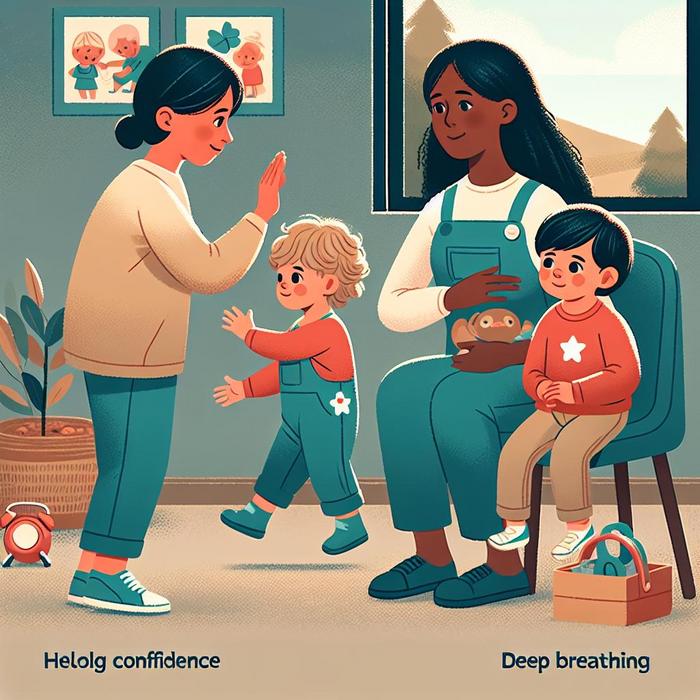Understanding Toddler Separation Anxiety
Dealing with toddler separation anxiety is a common issue many parents face. Separation anxiety in children is typical during the toddler years, and while it can be a challenging phase, it’s important to remember that it is a normal part of early child development. Your little one is starting to understand their individuality and how they are separate from you. This newfound understanding can cause anxiety when you are not around. Here are some helpful toddler separation anxiety tips to help both you and your child navigate this transition.
Common Signs of Separation Anxiety
Knowing the signs of toddler separation anxiety is the first step in effectively managing it. Some common signs include:
- Excessive crying when left with other caregivers
- Clinginess and not wanting to play alone
- Disturbed sleep patterns
- Regression in previously learned skills
- Anxiety and fearfulness in new situations
- Frequent tantrums, especially during transitions
Calming Techniques for Toddlers
One of the most valuable tools in your parenting arsenal is your ability to calm and soothe your child. Here are some calming techniques you can use:
- Engaging in soothing sensory activities
- Using distraction as a tool
- Consistent and regular routine
- Using a transitional object
- Gradually increasing separation time
HealthyChildren has a great range of resources to help you develop calming techniques tailored to your child’s needs.
Easing the Drop-off Transition
Easing the drop-off at day care or preschool can be a challenging moment for both you and your toddler. Here are some strategies that may help:
- Establish a consistent goodbye ritual
- Keep goodbyes short and sweet
- Ensure your child is comfortable and familiar with their caregiver or teacher
- Communicate about your child’s feelings
- Remain calm and positive
Building Confidence in Toddlers
Another important aspect of managing separation anxiety is building confidence in your toddler. Here’s how you can help them feel more secure:
- Positive reinforcement for independent behavior
- Arrange playdates with other children
- Provide safe opportunities for independence
- Encourage social interaction
UNICEF and Melbourne Child Psychology provide in-depth advice for building confidence in children, which can help manage separation anxiety.
Consulting a Professional for Advice
If your child’s separation anxiety is causing significant distress for your child or disrupting your family life, it may be time to consult with a child psychologist or pediatrician. Professional advice can provide you with further strategies and help ease this difficult phase.
Importance of Sleep in Managing Separation Anxiety
A key factor often overlooked in managing toddler separation anxiety is the quality of sleep your child is getting. Poor or insufficient sleep can heighten feelings of anxiety in toddlers. Implementing a consistent bedtime routine, ensuring your little one is getting enough sleep, and addressing any potential sleep disorders can make a significant difference in helping to ease separation anxiety. I found this insightful article about how to improve a toddler’s sleep quality that I highly recommend.
Help your Toddler Understand Your Absence
Understanding that you’ll return is a concept that many toddlers struggle with. It is important to consistently reassure your child that you will always come back after a period of absence. You can do this by explaining where you are going, how long you will be gone for, and when you’ll return. You can also start preparing your child for your absence well ahead, as suggested in this helpful post.
Using Storybooks to Address Separation Anxiety
Reading books that tackle the subject of separation anxiety can be a helpful tool to aid toddlers in understanding their feelings. These storybooks often depict characters going through similar experiences which can make children feel less alone in their anxiety. Plus, books offer a great opportunity for conversation – you can discuss the story and characters, and relate it to your toddler’s feelings.
When to Seek Professional Help
While toddler separation anxiety is common and typically decreases as the child gets older, it’s important to seek professional help if the anxiety is severe, continues for a prolonged period, or if your child’s anxiety is interfering with their everyday activities and development. Professionals such as pediatricians and child psychologists are equipped with the knowledge and tools to provide useful strategies to manage your child’s anxiety.
Final Thoughts
Parenting a toddler with separation anxiety can be exhausting but remember, this phase of their development is only temporary. With patience, consistency, and the application of the right strategies, you can ease your child’s anxiety. Stick with it because all your hard work will help your child become a more confident and independent individual who feels safe in their environment.
Remember, you’re not alone – there are many resources available, such as support groups and forums like this one on Reddit, where you can connect with other parents who are going through the same struggle. Together, we can navigate this challenging, yet rewarding journey of parenting.
Recommended Resources
- Help Your Child with Separation Anxiety
- How To Calm Your Child’s Separation Anxiety
- Soothing Your Child’s Separation Anxiety
- Overcoming Separation Anxiety
